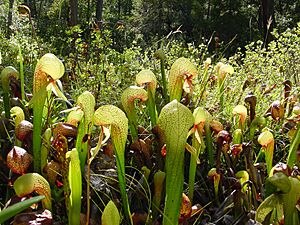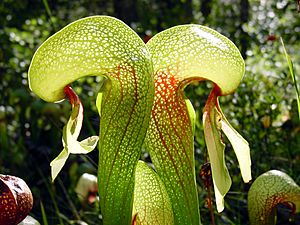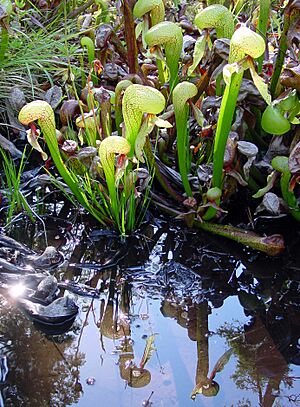Butterfly Valley Botanical Area facts for kids
The Butterfly Valley Botanical Area is a special protected place in the northern Sierra Nevada mountains of California. It was set aside in 1976 because it has so many different kinds of plants. You can find it just north of Quincy in Plumas County. This area is managed by the Plumas National Forest. It sits at an elevation of about 3,590 to 3,800 feet (1,094 to 1,158 meters).
Contents
Discover Unique Plants in Butterfly Valley
This botanical area is famous for its rare and interesting plants. It is a great place to learn about different types of plant life.
Meet the Carnivorous Plants
One of the most exciting plants here is the Darlingtonia californica, also known as the California Pitcher Plant. This is a carnivorous plant, which means it eats insects! It grows only in certain wet, marshy areas called bogs. These bogs are found from the northern Sierra Nevada up through northern California and into southern Oregon.
Besides the California Pitcher Plant, you can find other carnivorous plants here too.
Orchids, Lilies, and Ferns
The Butterfly Valley Botanical Area is also home to many other beautiful plants. You can see about a dozen different kinds of native orchids, including Piperia species. There are also many types of native lilies, like the Lilium washingtonianum and Lilium parvum. The area is rich in native California ferns and many other California native plants.
History of Butterfly Valley
Before it became a protected area, Butterfly Valley had a busy past. People used the land for different activities.
Mining in the 1850s
In the early 1850s, people came to Butterfly Valley looking for valuable minerals. There was even a small mining town here. But once the mines ran out of minerals, the town was left empty.
Ranching and Logging Activities
After mining ended, the land was used for raising cattle and cutting down trees. In the early 1900s, the Galeppi brothers brought their cattle to graze here. Ranching continued until 1976, when the area became protected.
Logging also took place in the valley. Companies like Murphy Lumber Company and Quincy Lumber Company cut down trees. Logging operations finally stopped in 1950.
 | Jessica Watkins |
 | Robert Henry Lawrence Jr. |
 | Mae Jemison |
 | Sian Proctor |
 | Guion Bluford |




